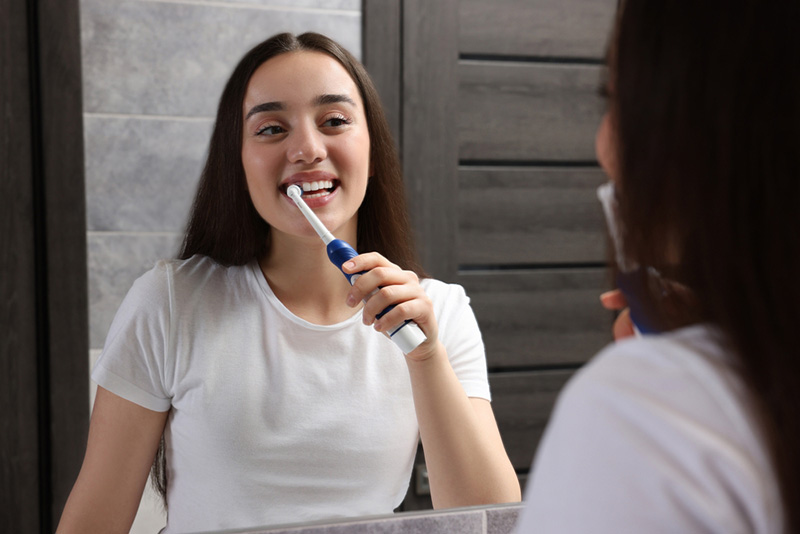
Electric toothbrushes have become increasingly popular over the past several years. But are they actually better than manual toothbrushes for cleaning your teeth?
There has been extensive research comparing electric and manual toothbrushes, looking at factors like plaque removal, gingivitis reduction, and more. This article will dive into that research to help you decide if investing in an electric toothbrush is worth it.
Are Electric Toothbrushes Better Than Manual Ones?
Overall, research has shown that electric toothbrushes are moderately better at removing plaque and reducing gingivitis than manual toothbrushes.
A systematic review published in the Journal of Clinical Periodontology analyzed 38 studies comparing manual and electric toothbrushes. It found that electric toothbrushes removed plaque 11% more effectively and reduced gingivitis 21% more effectively than manual toothbrushes on average.
So electric brushes do seem to provide some benefits, though the benefits are relatively modest according to the research. Manual toothbrushes can still be very effective when used properly.
The Benefits of Electric Toothbrushes
What are the main advantages electric toothbrushes offer over their manual counterparts? Why do electric toothbrushes clean better? Here are some of the reasons why:
- More consistent technique: Electric brushes automatically move the bristles for you in a steady motion, removing some of the human error and inconsistency from brushing. This can help ensure all areas get brushed adequately.
- Longer brushing time: Many electric brushes have built-in timers that encourage brushing for 2+ minutes, the recommended brushing time. This can motivate people to brush longer.
- Better reach: The oscillating, rotating motions of electric heads can help the bristles reach areas that are often missed by manual brushing, like the back molars.
- Gentler on gums: High-quality electric brushes tend to be less abrasive on gums than vigorous manual scrubbing. The bristles do most of the work.
- Motivating features: Features like timers, pressure sensors, and Bluetooth connectivity can make brushing more interactive and fun, especially for kids.
- Aid for those with dexterity issues: The automated motions make electric brushes easier to use for those with grip difficulties or arthritis.
The Drawbacks of Electric Toothbrushes
Despite their advantages, electric toothbrushes also come with some downsides:
- Higher cost: Electric brushes have a substantially higher upfront cost, from $50-$200+ depending on features. The replacement brush heads can also be expensive.
- Require charging: Electric brushes must be charged, unlike manual ones. The battery can die at inconvenient times if not charged regularly.
- More difficult to travel with: Traveling with electric brushes can be bulky due to the charger and heads. Manual brushes are far more portable.
- Over-reliance on technology: Some worry that relying too much on the electric technology may cause people to brush manually less effectively when not using the electric brush.
- Not as thorough: While electric brushes aid plaque removal, some studies show manual brushing performed correctly may still remove more plaque in hard to reach areas.
- Quality matters: If quality of the bristles and the brush itself isn’t high, then the electric brushes can potentially cause more damage such as enamel wear and/or gingival recession leading to dental sensitivity and other teeth and gum problems.
Are Electric Toothbrushes Better for Kids?
What does the research say about electric toothbrushes for children specifically?
Several studies have found that electric toothbrushes can be more effective than manual ones for removing plaque in children. Many studies also show that electric toothbrushes are even more effective for children than they are for adults.
The large oscillating heads, cartoonish designs, built-in timers, and smartphone apps that come with some electric brushes may also make brushing more fun and engaging for kids. Anything that makes brushing less of a chore and gets them cleaning better is beneficial.
Should I Start Using an Electric Toothbrush?
Here are some things to consider when making the decision:
- Your manual technique: If you already use impeccable manual technique, you may not benefit much from upgrading. If your manual technique could use improvement, it may help.
- Your oral health: If you get a lot of plaque buildup or deal with gingivitis, an electric brush could provide a modest boost to your oral hygiene.
- Sensitivity: If you have sensitive gums, the gentler motion of electric heads may be beneficial.
- Your budget: Electric brushes range greatly in price. Make sure to buy one that fits your budget.
- Features: Determine if you want features like pressure sensors, apps, multiple modes, travel cases, etc. and buy accordingly.
- Willingness to charge: Remember, electric brushes must be charged regularly. Manual brushes never run out of batteries.
Final Thoughts
While electric toothbrushes have advantages over manual brushes, the benefits are small to moderate. The quality of your oral health depends a lot more on your personal habits and attention to detail. The toothbrush you choose matters as well. Certain toothbrushes are higher-quality.
If you’d like to learn more about the connection between oral health and overall health, check out Dr. Kami Hoss’s book, “If Your Mouth Could Talk”!

